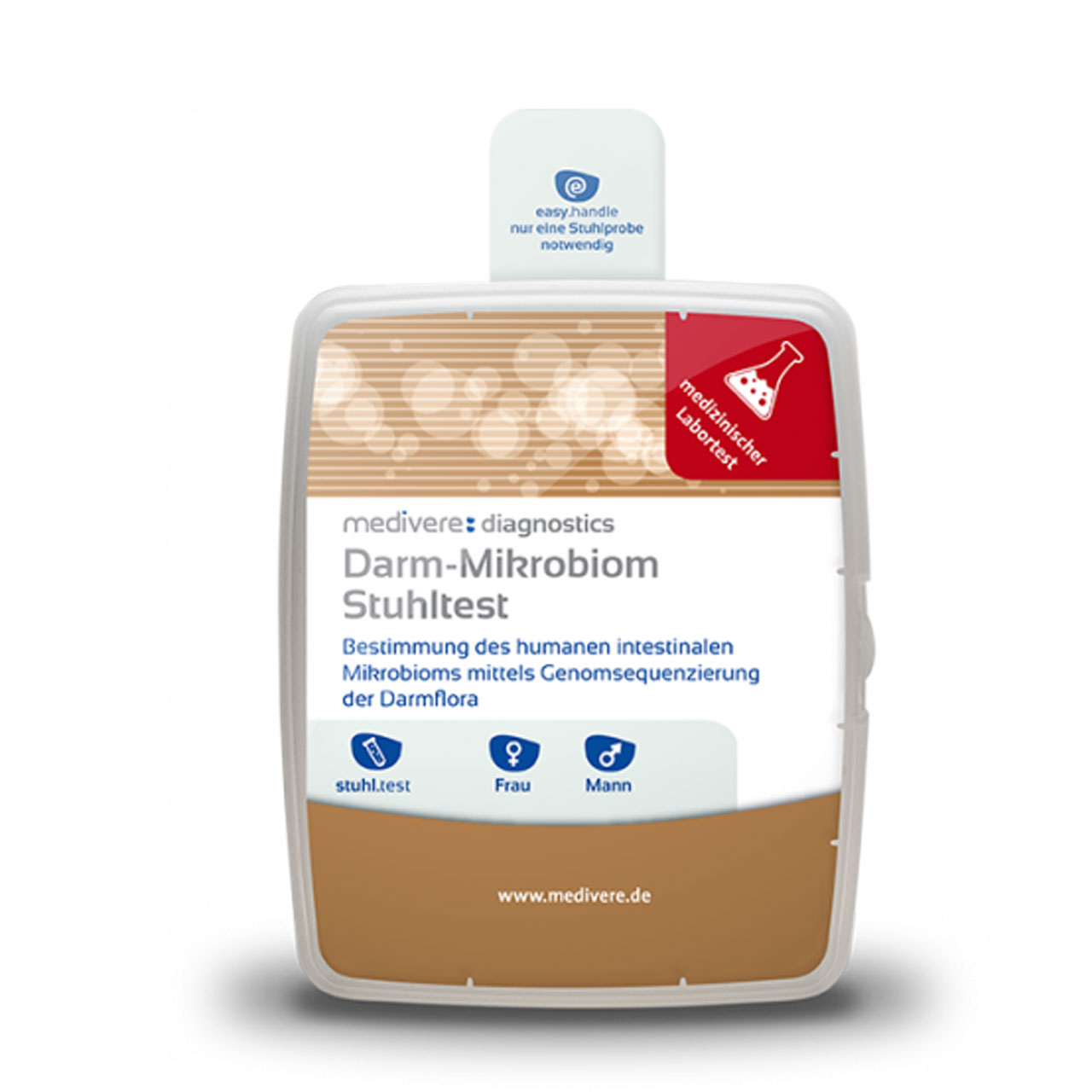| Quantity | Unit price |
|---|---|
| To 1 |
€190.54
|
| To 9 |
€181.00
|
| From 10 |
€171.50
|
Available in 3 days, delivery time 1-4 days
Customers from countries other than Germany and Austria: Please note the restrictions below!
For recording and assessing the intestinal microbiome of the gut
The intestinal microbiome refers to the totality of all microorganisms that colonise the intestine. A balanced ratio of intestinal bacteria is essential for human health. This is because, as numerous studies have shown, an imbalance in the gut microbiome is associated with various diseases. These include metabolic syndrome, diabetes, inflammatory bowel diseases such as Crohn's disease and ulcerative colitis, irritable bowel syndrome, bowel cancer, calcium oxalate urinary stones, cardiovascular diseases, rheumatoid arthritis and neurological disorders.
The so-called next-generation sequencing method has so far only been used in a scientific context to recognise imbalances in the intestinal flora. In contrast to conventional stool diagnostics, it not only covers a limited range of intestinal bacteria, but also the molecular genetic analysis of the entire bacterial intestinal microbiome. In addition, the effects of the individual, highly complex microbiota on colonisation resistance, digestive processes, absorption of nutrients and vitamins as well as on immunity can be assessed more precisely.
The analysis even detects anaerobic bacteria that cannot be cultured. The standard of microbiological stool diagnostics in the 20th century was mainly based on culture, culture media and subsequent enzymatic differentiation. However, very few of the anaerobic bacteria (approx. 99% of intestinal bacteria) grow using cultural methods. In recent years, there has been a rapid development in examination methods. In modern laboratories, the identification of bacteria from the plant on culture media is now largely carried out using mass spectrometry (MALDI-TOF = Matrix Assisted Laser Desorption Ionisation-Time of Flight) or directly from the submitted material using molecular biological methods (PCR = Polymerase Chain Reaction). However, the disadvantage is that PCR is a very selective and cost-intensive technology.
The microbiome data and its expertise can be updated and expanded at regular intervals in the future so that new findings are reflected in the results.
The molecular genetic analysis includes
- Analysing the biodiversity of the intestinal microbiome (diversity)
- Statement on the bacterial dysbiosis
- Determination of the enterotype
- Frequency distribution of the most important bacterial strains>
- Determination of the Firmicutes/Bacteroidetes ratio
- Assessment of the mucosaprotective flora
- Analysis of risk factors for dysbiosis-associated diseases
The test kit includes:
- 1 instruction for sample collection
- 1 set of instructions for requesting results
- 1 sample receipt
- 1 guarantee certificate
- 1 sample container incl. label in shipping container
- 1 microbiome sample tube with label in shipping container
- 1 stool catcher
- 1 shipping container
- 1 envelope
How does the ordering process work?
The link"To article" will take you to the manufacturer's website where you can purchase the product. After your order, Medivere will send you the desired test pack with detailed instructions. You place your sample in a tube and send it in a prepared envelope to Medivere's partner laboratory, GANZIMMUN DIAGNOSTICS AG. You will receive a report with the evaluation of your profile after approx. 14 working days.
Only for Germany and Austria
- We would like to point out that these tests and the shipping processes are optimized for Germany and Austria and are prepaid.
- Samples must be delivered to the German laboratory within 4 days. This cannot be guaranteed for samples shipped from other countries!
- Orders from countries other than Germany and Austria are therefore at your own risk. In this case, we only accept the payment method "Prepayment (directly to us)", as customers cannot then cancel the purchase, e.g., because the sample arrived at the laboratory unusable through their own fault. Purchases made with any other payment methods that customers could unlawfully reverse will be immediately canceled and refunded.
- You can find more information about this from the manufacturer!
| Application: | Immune system, Digestion |
|---|---|
| Product Type: | Medizinprodukt |
| Test-Art: | Stuhltest |
Sensible nutritional supplements after a sensible analysis!
Vitamins and minerals can best be dosed if you know exactly what your supply or deficiency of a nutrient is. Our customers can take this into their own hands with the test kits from Medivere! Test kits that we have in stock can be ordered from us. For test kits that are not in stock, we refer you directly to the manufacturer, who will be happy to send them to you without going through us*. You are then welcome to send us your test results and we will be happy to advise you on which products you need. For more comprehensive health advice, we are also happy to refer you to experienced alternative practitioners and osteopaths with whom we work**. You will then also receive a 5% voucher for your next purchase from us (our favourable graduated prices with a 5-10% volume discount naturally apply in addition to the voucher).
*The green button will then say "to product" instead of "shopping basket". We receive a small payment from Medivere for this advertising. **They are also happy to accept you personally as a client if you are in Dresden or Bautzen. If not, tele-appointments may also be possible.
Manufacturer's address: medivere GmbH, Hans-Böckler-Straße 109, 55128 Mainz, Germany.
E-Mail:medizinproduktesicherheit@medivere.de

Login

